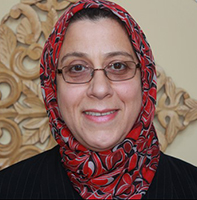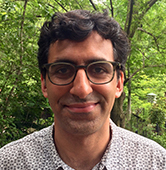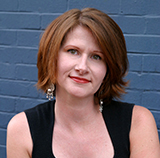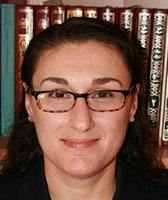2016 Election of Officers and Members of the Board
MESA is pleased to present the candidates in the 2016 Election of Officers and Members of the Board. Click on the candidate's name to go to their biography. Voting deadline is Friday, October 14, 2016, at 11:59 p.m., Mountain Standard Time.
Candidates for President-Elect
Click on the name to go to the biography. On the ballot, you will vote for 1.
|
|
|
|
Amaney A. Jamal
Edwards S. Sanford Professor of Politics, Department of Politics, Princeton University (2014-2016); Director, Bobst Center for Peace and Justice, Princeton University (2012-present); Director, Workshop on Arab Political Development, Princeton University (2010-present); Professor (Fall 2013), Associate Professor (July 2010-2013), Assistant Professor (July 2003-June 2010), Department of Politics, Princeton University; Assistant Professor, Department of Political Science, Columbia University (July 2002-June 2003).
Education: PhD, University of Michigan, Department of Political Science, 2003; BA, Cum Laude, University of California, Los Angeles, Department of Political Science, 1993.
Service to Profession: MESA Service: Program Committee, 2008, 2014; Nominating Committee, 2005, 2015; Editorial Board, IJMES, 2007-10; Other Service: Council Member, American Political Science Association (APSA), Fall 2015; President, Association for Middle East Women’s Studies (AMEWS), 2014-present; Steering Committee, APSA, Middle East and North Africa Taskforce, Summer 2012-present; Treasurer, APSA, Comparative Democratization, Fall 2011-2013; Steering Committee, Project on Middle East Political Science (PoMEPS), Winter 2011-present; Secretary/Treasurer, AMEWS, 1999-2010.
Awards and Grants Received: Bobst Foundation: Collaborative Research Network with the American University of Beirut-Issam Fares Institute, and Princeton University, Fall 2013; National Science Foundation: Experimental Research on Religious Scripture and Political Behavior in the Muslim World (with Tarek Masoud), Fall 2013; 2008 Best Book Award: Barriers to Democracy: The Other Side of Social Capital in Palestine and the Arab World, Comparative Democratization Section, American Political Science Association; Lijphart/Przeworski/Verba Dataset Award for the Arab Barometer, Summer 2010.
Publications: Books: Of Empires and Citizens: Pro-American Democracy or No Democracy at All, Princeton University Press, 2012; Barriers to Democracy: The Other Side of Social Capital in Palestine and the Arab World, Princeton University Press, 2007; Race and Arab Americans after 9-11: From Invisible Citizens to Visible Subjects (edited with Nadine Naber), Syracuse University Press, 2008; Citizenship and Crisis: Arab Detroit after 9-11, (Co-authors Wayne Baker, Sally Howell, Ann Lin, Andrew Shryock, Ron Stockton, and Mark Tessler) Russell Sage, 2009. Articles: “Arab Responses to Western Hegemony: Experimental Evidence from Egypt” (With Tarek Masoud and Elizabeth Nugent), forthcoming, The Journal of Conflict Resolution; “Explaining Divergent Revolutionary Coalitions: Regime Strategies and the Structuring of Participation in the Tunisian and Egyptian Revolutions” (with Mark Beissinger and Kevin Mazur), Comparative Politics, October 2015; “To Vote or Not to Vote: The Determinants of Electoral Participation in the Arab World” (with Mark Tessler and Carolina De Miguel), Comparative Political Studies,September 2015 (Lead Article); “America in the Eyes of Arabic Tweeters” (with Robert O. Keohane, David Romney and Dustin Tingley), Perspectives on Politics, March 2015; “Is it Gender, Religion or Both? A Survey Experiment on Electability in Transitional Tunisia” (with Ellen Lust and Lindsay Benstead), Perspectives on Politics, March 2015; “Anti-Americanism, Authoritarianism, and Attitudes about Women in Politics: Evidence from a Survey Experiment in Jordan” (with Sarah Bush), International Studies Quarterly,March, 2015; “Religion in the Arab Spring: Between Two Competing Narratives” (with Michael Hoffman), Journal of Politics 76:3 July 2014. (Lead Article); “Governance and Health in the Arab World” (with Rajaie Batnij, Lina Khatib, Melani Cammett, Jeffrey Sweet, Sanjay Basu, Rita Giacaman, and Paul Wise), The Lancet, January 2014; “Can Washington Win over the Arab Street?”, Foreign Affairs, October 2013.
Judith E. Tucker
Georgetown University: Professor of History, 1997-present; Director, Master of Arts in Arab Studies Program, 2000-2009, 2011-2013; Associate Professor of History, 1988-1997; Assistant Professor of History, 1983-1988. School of Foreign Service in Qatar, Georgetown University: Visiting Professor 2009-2011; American University in Cairo: Visiting Professor, 2000.
Education: M.A., Ph.D., History and Middle East Studies, Harvard University, 1981; Graduate study, Ecole pratique des hautes etudes, Paris, 1971-72; Graduate study, American University of Beirut, 1969-71; B.A., Government, Harvard/Radcliffe College, 1969.
Service to the Profession: MESA: Editor, International Journal of Middle East Studies, 2004-2009; Chair, Annual Meeting Program Committee, 2002; Member, Board of Directors, 1989-1992; Chair, Ethics Committee, 1990-1992. Other Service: Co-editor, Brill series: Women and Gender: Middle East and Islamic World, 2013-present; Editorial Board, American Historical Review, 2013-2016; Editorial Board, Journal of Middle East Women’s Studies, 2011-present; Editorial Board, Women’s History Review (UK) 2010-present; Editorial Board, Cambridge Middle East Studies, Cambridge University Press, 2000-present; National AP World History Committee, 1998-2002; Steering Committee, Amsterdam Centre for Middle Eastern Studies, 2013-present; Board of Directors, Palestine-American Research Center, 2014-present. Manuscript reviewer: E.J. Brill, Cambridge University Press, Harvard University Press, University of California Press, University of Texas Press, Yale University Press. Accreditation and evaluation reviews: the American University in Dubai, King Abdul-Aziz University (Jiddah), Duke University, University of California (Davis), University of Cyprus, and the Palestine-American Research Center.
Award and Grants: The Cynthia Nelson Institute for Gender and Women’s Studies, American University in Cairo, Visiting Research Scholar, Spring 2007; American Research Center in Egypt/National Endowment for the Humanities Research Fellowship, 2002-2003; Fulbright Serial Grant, Birzeit University, 2000, 2001; Fulbright Senior Scholar, Jerusalem, 1994; Fulbright-Hays Faculty Research Abroad Fellowships, England and Jordan, 1990-91; National Endowment for the Humanities Summer Research Grant, 1989; Social Science Research Council Research Fellowship, 1982-83.
Publications: Books: Authored: Women, Family, and Gender in Islamic Law, Cambridge University Press, 2008, Turkish translation, Acilim Books (Turkey), 2013; In the House of the Law: Gender and Islamic Law in Ottoman Syria and Palestine, University of California Press, 1998, AUC Press, 1999; Women in Nineteenth Century Egypt, Cambridge University Press, 1985, AUC Press, 1986, Arabic translation, the National Council for Translation in Egypt, 2007; Women in the Middle East and North Africa. Restoring Women to History (with Guity Nashat), Indiana University Press, 1999. Edited: Arab Women: Old Boundaries, New Frontier, Indiana University Press, 1993; A Social History of Women and the Family in the Middle East (with Margaret Meriwether) Westview Press, 1999, Arabic translation, General Egyptian Book Organization, 2007. Select articles and chapters: “Salim the Algerine: The Muslim Who Strayed into Colonial Virginia,” in Marwan Kraidy and Alex Lubin, ed., American Studies Encounters the Middle East, University of North Carolina Press, 2016; “She Would Rather Perish: Piracy and Gendered Violence in the Mediterranean,” Journal of Middle East Women’s Studies, vol. 10, #3, Fall 2014; “Telling Tales: Women in the Early Modern Arab World,” in Amy E. Leonard and Karen Nelson, eds., Attending to Early Modern Women – And Men. University of Delaware Press, 2010; “Dowering Elite Palestinian Women,” a forum article, Early Modern Women: An Interdisciplinary Journal, vol. 4, 2009; “Questions of Consent: Contracting a Marriage in Ottoman Syria and Palestine,” in Frank Vogel and Asifa Quraishi, eds., The Islamic Marriage Contract: Case Studies in Islamic Family Law, Harvard University Press, 2008.
Candidates for Board of Directors
Click on the name to go to the biography. On the ballot you will vote for no more than 2.
|
|
|
|
Arang Keshavarzian
Associate Professor of Middle Eastern and Islamic Studies, New York University (2008-present); Assistant Professor of Government, Connecticut College (2006 – 2008); Assistant Professor of Political Science, Concordia University (2003 – 2006).
Education: PhD, Politics, Princeton University (2003); MAIS, Middle East Studies, University of Washington (1996); AB, Washington University, St. Louis (1994).
Service to Profession: MESA: Member of the 2016 Malcolm H. Kerr Dissertation Award Committee; Member of editorial board, International Journal of Middle East Studies (2010-2014). Other Service: Member of editorial committee, Middle East Research and Information Project (2004-2011 and 2016-present); Member of editorial board, Tadween Publishing (2012 – Present); Member of Editorial Board, Arabian Humanities (2012 – Present); Member of Steering Committee, Iran Graduate Student Workshop, New York University, Princeton University, and the University of Pennsylvania (2015 – present); Co-director of Interuniversity Consortium of Arab and Middle East Studies, Montreal (2004-2006); Member of the Program Committee, 2014 International Society of Iranian Studies Conference.
Awards and Grants:Visiting Research Fellow, Niehaus Center for Governance and Globalization, Princeton University (2008-2009); Établissement de nouveaux professeurs-chercheurs, Funds Québecois des recherche sur la société et la culture (2004-2007); Mellon Foundation Research Fellowship, Summer (2000); Social Science Research Council, International Predissertation Fellowship (1998-1999).
Publications (selected): Bazaar and State in Iran: Politics of the Tehran Marketplace (Cambridge University Press, 2007); Special Section in Geopolitics: “Transnational Connections in the Middle East,” Geopolitics (coedited with Waleed Hazbun) (2010); “When Ties Don’t Bind: Smuggling Effects, Bazaars, and Regulatory Regimes in Postrevolutionary Iran,” (with Narges Erami) Economy and Society (2015); “Analyzing Authoritarianism in an Age of Uprisings,” Arab Studies Journal (2014); “Geopolitics and the Genealogy of Free Trade Zones in the Persian Gulf,” Geopolitics (2010); “Regime Loyalty and Bâzâri Representation under the Islamic Republic of Iran: Dilemmas of the Society of Islamic Coalition,” International Journal of Middle East Studies (2009); “Turban or Hat, Seminarian or Soldier: State Building and Clergy Building in Reza Shah’s Iran,” Journal of Church and State (2003); “State-Building and Religious Resources: An Institutional Theory of Church-State Relations in Iran and Mexico,” (with Anthony Gill) Politics and Society (1999); “Places in Shadows, Networks in Transformation: An Analysis of the Tehran Bazaar’s Publicness,” in Shami (ed.), Publics, Politics and Participation: Locating the Public Sphere in the Middle East and North Africa (2009); “Contestation without Democracy: Elite Fragmentation in Iran,” in Pripstein Posusney and Penner Angrist (eds.), Authoritarianism in the Middle East (2005); Various essays in Middle East Report 2001-2016.
Mark LeVine
Professor, Department of History, UC Irvine, 2001-present; Distinguished Visiting Professor, Center for MES, Lund University; 2010-present.
Education: PhD, Department of Middle East and Islamic Studies, NYU, 1999; MA, Kevorkian Center for MES, NYU, 1993; BA, Hunter College, CUNY.
Service to the Profession: MESA: Member of CAF-NA, 2009-14. Other Service: Founder and Director, Program and Major in Global Middle Eastern Studies, UCI, 2015-present; Middle East advisor, Freemuse, 2006-present and Safemuse, 2014-present; Editorial Committee, UC Press, 2015-present; Academic Organizer, 3rd International Conference on Translation, Baghdad, 2013; Senior columnist, al-Jazeera English.
Awards and Grants: University of South Australia, Center for Muslim and non-Muslim Understanding Research Award, “Art at the Edge: Creativity and Culture in Africa and the Middle East (2015-2016); Swedish Research Council, “States of Disarray” (2016); Lund University/AUB, PI, “Globalization and Human Rights: Research, Advocacy and Public Policy Across the Arab World,” 2012-present; Fulbright Senior Researcher Award, Islam in Italy and Europe, 2006.
Publications: Books: (Abridged) The Five Year Old Who Toppled a Pharaoh (UC Press, forthcoming); Islam and Popular Culture (co-editor with Karin van Nieukerk and Martin Stokes (2016); One Land, Two States: Israel and Palestine as Parallel Sates (co-editor with Mathias Mossberg, UC Press, 2014); Struggle and Survival in Palestine/Israel (co-editor with Gershon Shafir, UC Press, 2012); Impossible Peace: Israel/Palestine Since 1989 (Zed Books, 2009); Heavy Metal Islam (Random House, 2008, Film/TV documentary, 2014); Religion, Social Practice and Contested Hegemonies: Reconstructing the Public Sphere in Muslim Majority Societies (co-editor with Armando Salvatore, Palgrave, 2005); Why They Don’t Hate Us: Lifting the Veil on the Axis of Evil (Oneworld, 2005); Overthrowing Geography: Jaffa, Tel Aviv and the Struggle for Palestine, 1880-1948 (UC Press, 2005). Recent Selected Articles and Chapters: “Theater of Immediacy: Dissident Culture, Revolutionary Performance, and Transversal Movements in the Arab World” (with Bryan Reynolds), in van Nieukerk, LeVine and Stokes eds., Islam and Popular Culture, 2016; “Art and Resistance as a Human Rights Struggle in the Arab Uprisings,” in Anthony Tirado Chase, ed. Routledge Handbook of Arab Human Rights Studies, forthcoming; “Music and Resistance in the Arab Spring,” in Larbi Sadiki, ed., Resistance Cultures and Politics in the Arab World, Routledge, 2014; “In Lieu of Conclusion: from Bare life to Dignity,” in Emel Akcali, ed., Neoliberal Governmentality and the Future of the State in the Middle East and North Africa, NY: Palgrave, 2015; “Theorizing Revolutionary Practice: Agendas for Research on the Arab Uprisings,” Critique, 22 (3), Fall 2013; “How a Music about Death Affirms Life: Middle Eastern Metal and the Return of Music’s Aura,” in Ian Peddie, ed., Popular Music and Human Rights, Ashgate, 2011.
Jillian Schwedler
Professor of Political Science, Hunter College and the Graduate Center, CUNY, 2013-present; Associate Professor of Political Science, University of Massachusetts, Amherst, 2007-2013; Assistant and then Associate Professor of Government and Politics, University of Maryland, 2000-2007 (promoted and tenured 2007).
Education: PhD, Politics, NYU, 2000; MA, Middle East Studies, NYU, 1993; BA, Near East Languages and Literatures, NYU, 1988.
Service to the Profession: MESA: Program Committee, 2009. Other Service: Steering Committee, Project on Middle East Political Science (POMEPS), 2010-present; Editorial Board, Stanford Studies in Middle Eastern and Islamic Societies, 2013-present; Editorial Board, Middle East Law and Governance, 2012-present; Steering Committee, Northeast Middle East Politics Workshop, 2011-present; Editorial Committee, MERIP, 1996-2001, 2014-present; Chair of the Board, MERIP, 2002-2009; Steering Committee, Palestinian-American Research Center, 2000-2002; review committees for USIP, Fulbright Scholars, Fulbright-Hayes, National Science Foundation, CAORC; co-leader, short course for American Political Science Association on Teaching the Middle East in Political Science, 2013; co-editor (with Bassam Haddad), Symposium on “Teaching the Middle East after the Arab Uprisings,” published in PS: Political Science, 2013.
Awards: Distinguished University Teaching Award, 2011, and Outstanding Teaching Award, 2010, both UMass; University of Maryland Award for Excellence in Mentoring, 2006; APSA Comparative Democratization Best Book Award, 2007. Funded Research: National Science Foundation, 2005-2008; USIP, 2006-2008; Fulbright New Century Scholar, 2003; Fulbright Scholar to Jordan, 1996-1997; CAORC, 1996-97; SSRC, 1996.
Publications: Books: Faith in Moderation (2006); Policing and Prisons in the Middle East, ed. (with Laleh Khalili) (2010); Islamist Movements in Jordan, ed. (1997); Toward Civil Society in the Middle East, ed. (1995). Textbook: Understanding the Contemporary Middle East, 2nd, 3rd, and 4th eds. Peer-reviewed Articles: “Islamists in Power? Inclusion, Moderation, and the Arab Uprisings,” Middle East Development Journal, 2013; “The Political Geography of Protest in Neoliberal Jordan,” Middle East Critique, 2012; “Can Islamists Become Moderates? Rethinking the Inclusion-Moderation Hypothesis,” World Politics, 2011; “Amman Cosmopolitan: Spaces and Practices of Aspiration and Consumption,” Comparative Studies in South Asia, Africa, and the Middle East, 2010; “Cop Rock: Protest, Identity, and Dancing Riot Police in Jordan,” Social Movement Studies, 2005; “Who Opened the Window? Women’s Activism in Islamist Parties” (with Janine Clark), Comparative Politics, 2003; “Insecurity Zones in South Lebanon” (with A.R. Norton), Journal of Palestine Studies, 1993. Additional Articles: Journal of Democracy; Democratization; PS: Political Science; Development; Middle East Report; Middle East Policy; SAIS Review of International Affairs, and thirteen book chapters. Online Articles: MERIP Online; Foreign Affairs Middle East Channel; Jadaliyya; Al-Jazeera English.
Heghnar Z. Watenpaugh
Associate Professor of Art History, University of California Davis, 2006-present; Assistant Professor of Architectural History, Aga Khan Career Development Professor, MIT, 2001-2005; Assistant Professor, Rice University, 1998-2001.
Education: PhD, Art History, UCLA, 1999; BA, UCLA, 1990; AA, Lebanese American University, 1988.
Service to Profession: MESA Service: Nominating Committee, 2006; Program Committee, 2000. Other Service: Department co-chair, University of California Davis, 2014-2015; Board, Syrian Studies Association, 2010-2012; Board, Society of Architectural Historians, 2007-2010; Secretary-Treasurer, Newsletter Editor, Historians of Islamic Art, 2001-2002; Nominating Committee, Turkish Studies Association, 2001-2004; Editorial Advisory Committee, Journal of the Society of Architectural Historians, 2014-2017; Editorial Board, International Journal of Islamic Architecture, 2012-present.
Awards: Ömer Lütfi Barkan Article Prize, Ottoman and Turkish Studies Association, 2015; Article Prize, Syrian Studies Association, 2007; Kostof Book Award, Society of Architectural Historians, 2006; Redhouse Prize, Turkish Studies Association, 1992. Grants Received Fellowship, Center for Advanced Study in the Visual Arts, National Gallery of Art, 2008-09; President's Humanities Fellowship, University of California, 2008-09, 2015-16; Getty Fellowship in the History of Art, 2004-2005; National Endowment for the Humanities, 2004.
Publications: Books: The Missing Pages: Art, Heritage and Genocide (Stanford University Press, forthcoming); The Image of an Ottoman City: Imperial Architecture and Urban Experience in Aleppo in the Sixteenth and Seventeenth Centuries (Leiden: Brill, 2004). Journal Issue Edited: “Cultural Heritage and the Arab Spring,” International Journal of Islamic Architecture (forthcoming 2016). Articles: “Cultural Heritage and the Arab Spring: War over Culture, Culture of War, and Culture War,” International Journal of Islamic Architecture (forthcoming); “Preserving the Medieval City of Ani: Cultural Heritage Between Contest and Reconciliation,” Journal of the Society of Architectural Historians, 2014; “Architecture without Images,” International Journal of Middle East Studies, 2013; “Learning from Taksim Square: Architecture, State Power, and Public Space in Istanbul,” Huffington Post, 2013; “When Art and Religion Collide,” Los Angeles Times, 2010; “An Uneasy Historiography: The Legacy of Ottoman Architecture in the Former Arab Provinces,” Muqarnas 2007; “Deviant Dervishes: Space, Gender and the Construction of Antinomian Piety in Ottoman Aleppo,” International Journal of Middle East Studies, 2005. Selected Chapters: “Resonance and Circulation: The Category ‘Islamic Art and Architecture’,” in Companion to Islamic Art and Architecture, eds. Gülru Necipoglu and F.B. Flood, forthcoming; “The Harem as Biography: Domestic Architecture, Gender and Nostalgia in Modern Syria,” in Harem Histories ed. Marilyn Booth,2010; “Museums and the Construction of National History in Syria and Lebanon,” in The British and French Mandates, ed. Méouchy and Sluglett, 2004.





